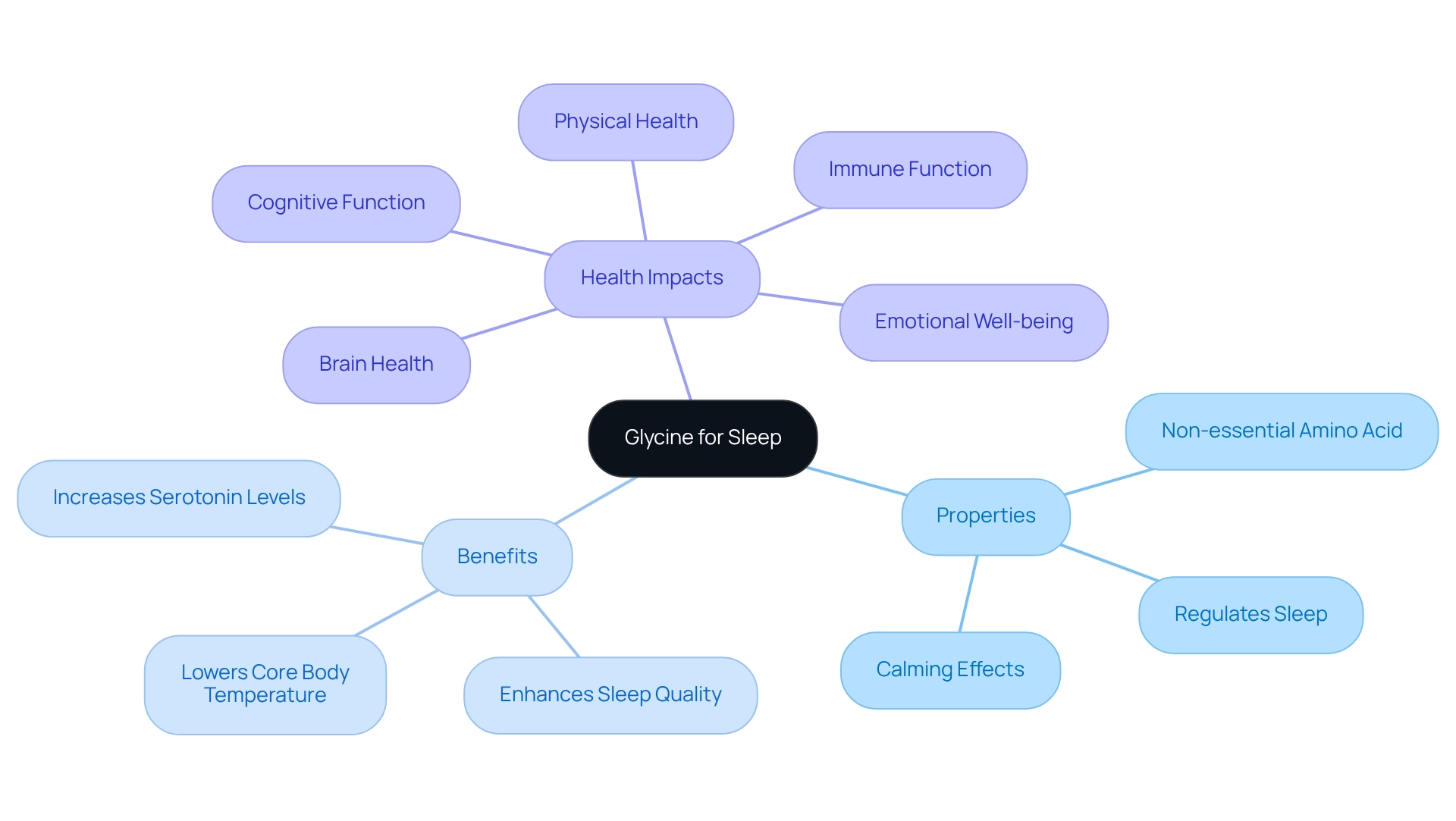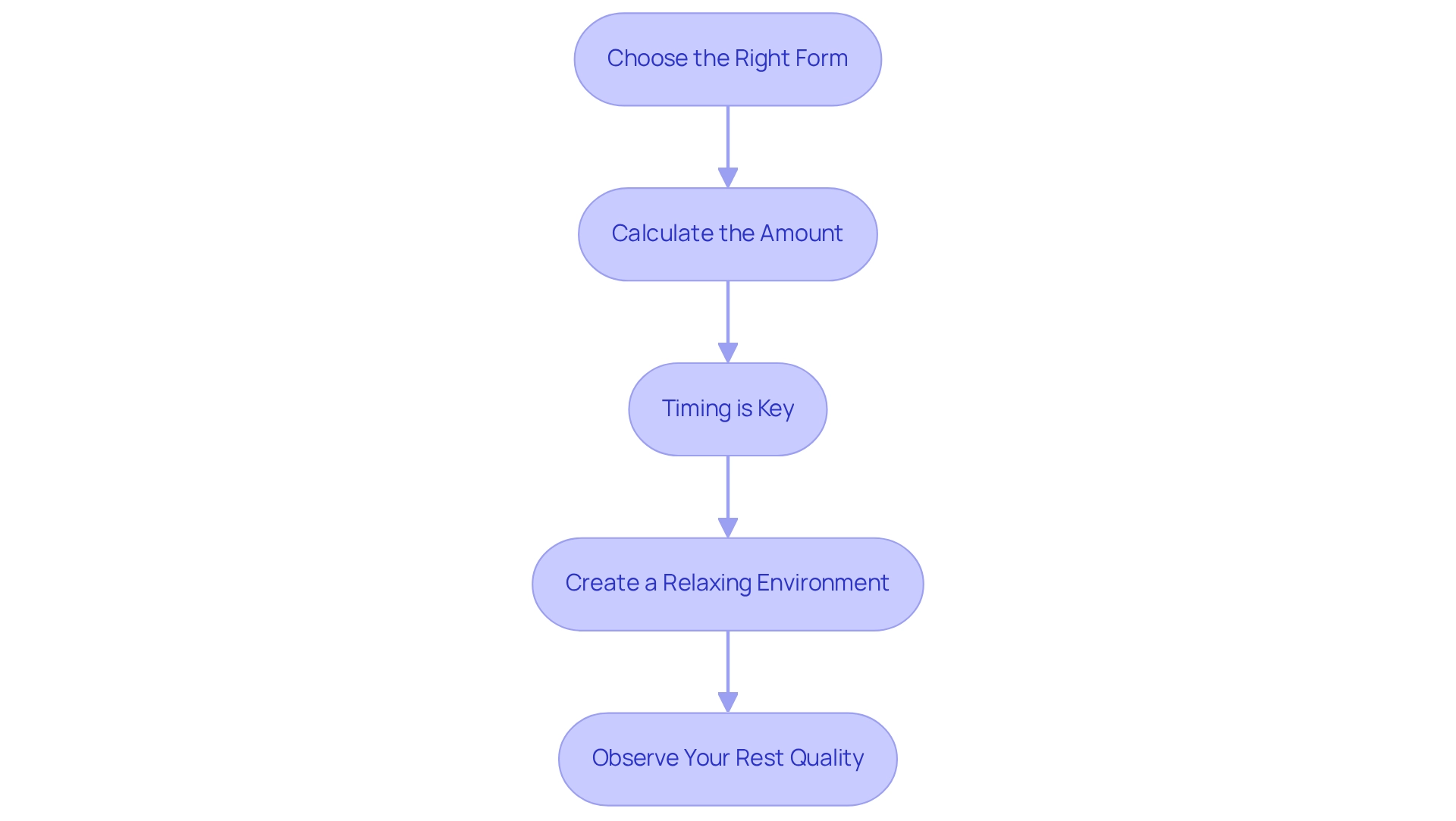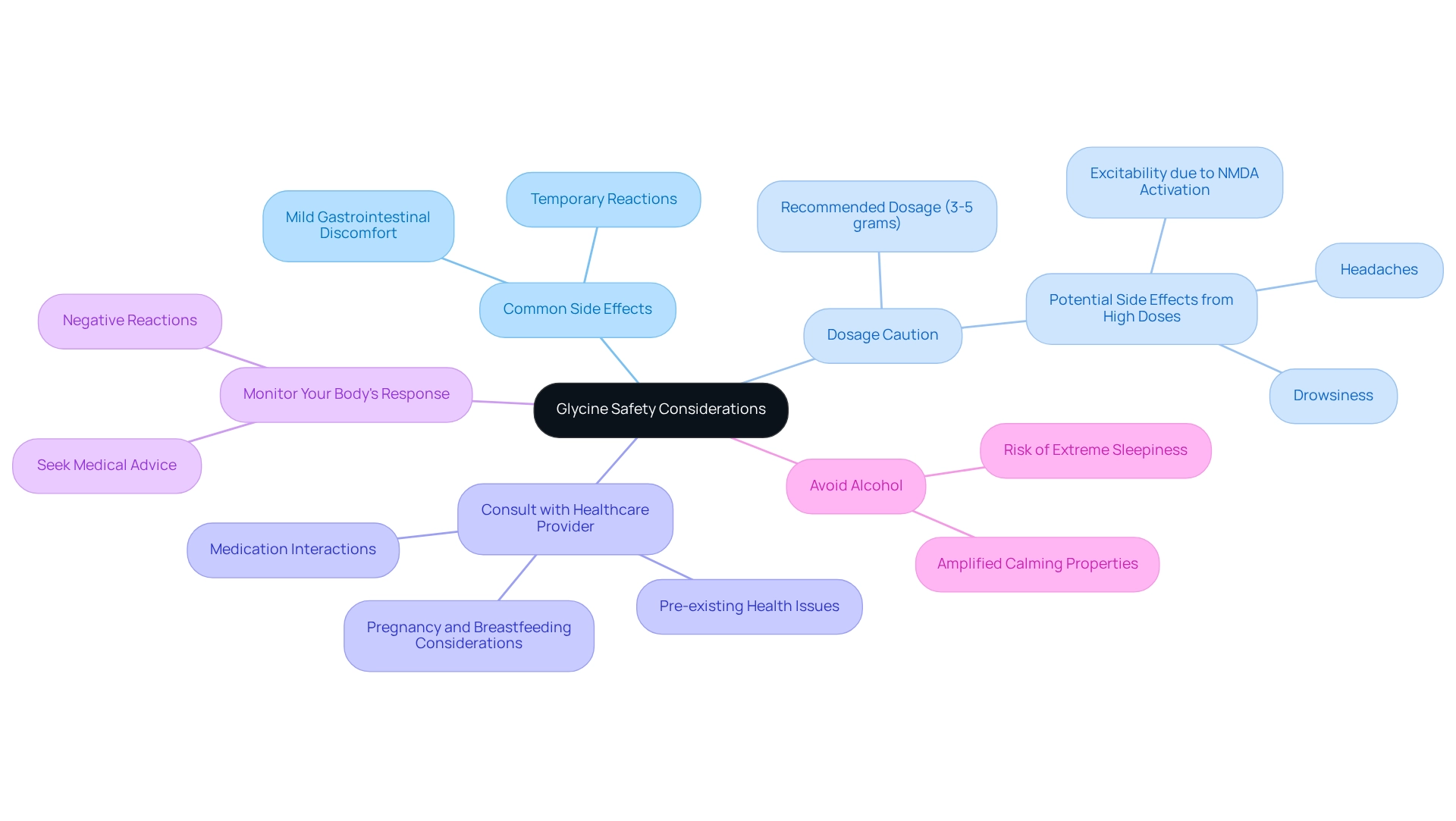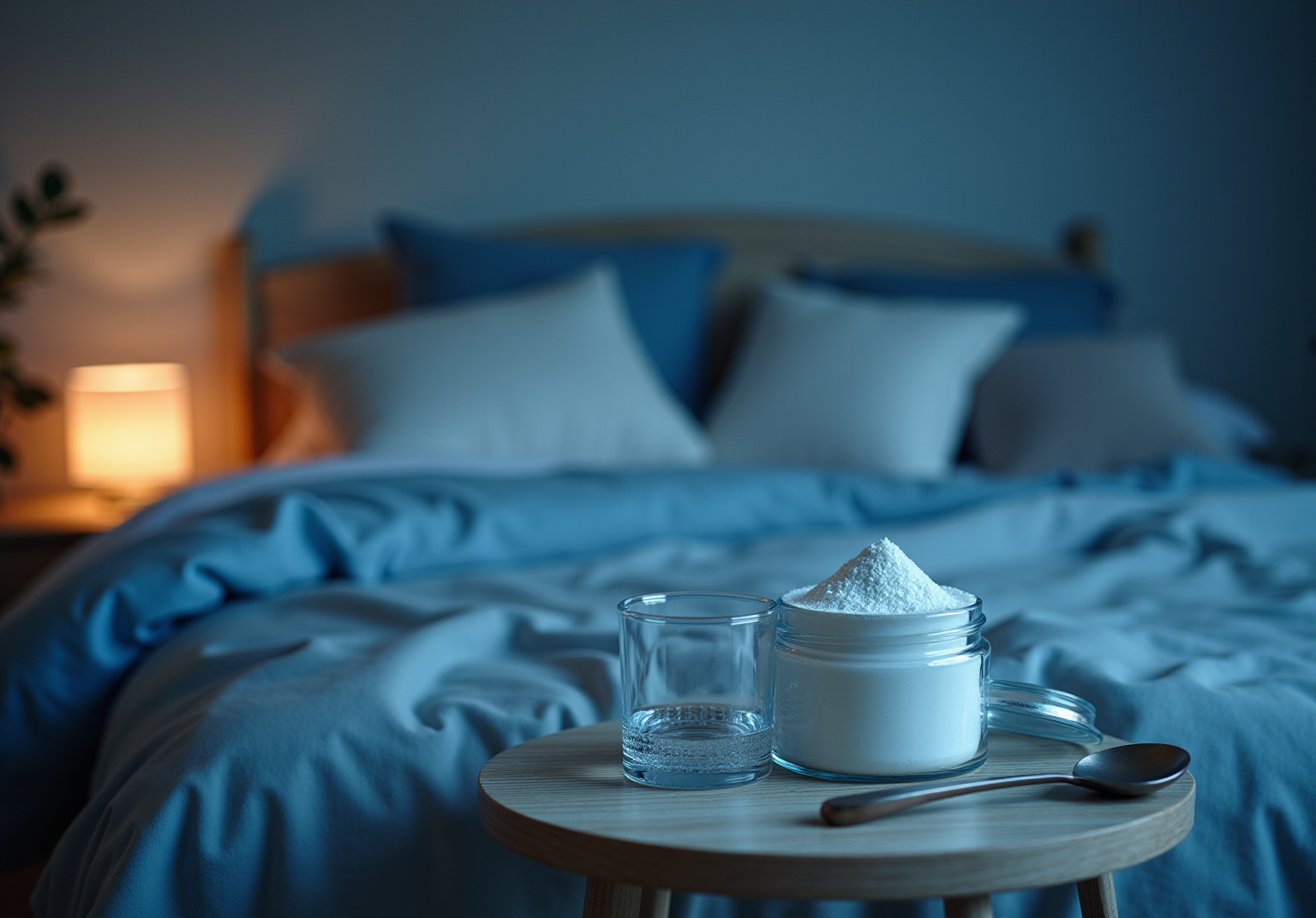Glycine for Sleep: Steps to Enhance Your Evening Routine
Overview
Glycine can enhance sleep quality by lowering core body temperature and increasing serotonin levels. This makes it a beneficial addition to evening routines for those struggling with sleep issues. A dosage of 3 grams before bedtime has been shown to improve sleep onset and efficiency.
Furthermore, the article provides practical steps for incorporating glycine into nightly habits while considering safety and potential side effects. By integrating glycine into your evening routine, you may experience a more restful night’s sleep.
Introduction
In the quest for better sleep, many individuals overlook the potential of a simple amino acid: glycine. This non-essential amino acid plays a crucial role in various bodily functions, particularly in enhancing sleep quality. Recent research has illuminated glycine’s remarkable ability to lower core body temperature and boost serotonin levels, paving the way for a more restful night.
As the consequences of poor sleep ripple through cognitive function, emotional health, and overall well-being, understanding the benefits of glycine becomes increasingly important. With a recommended dosage of just 3 grams before bedtime, glycine emerges as a promising ally for those grappling with insomnia or restless nights. This natural solution offers a pathway to improve sleep and rejuvenate the body.
Understand Glycine: Properties and Benefits for Sleep
Glycine for sleep is a non-essential amino acid that plays a crucial role in various physiological functions, especially in the regulation of sleep. Recent studies highlight glycine for sleep, showing its ability to enhance sleep quality by lowering core body temperature and increasing serotonin levels, which are both vital for initiating slumber.
Insufficient sleep has been negatively linked to:
- Cognitive function
- Physical health
- Brain health
- Emotional well-being
- Immune function
Research suggests that consuming 3 grams of glycine for sleep before bedtime can significantly improve the onset of sleep, enhance sleep efficiency, and reduce daytime drowsiness. This dosage has been associated with subjective improvements in sleep quality, making glycine for sleep a practical option for individuals struggling with insomnia or poor sleep experiences.
Furthermore, the calming effects of glycine for sleep on the central nervous system amplify its sleep-promoting properties, making it an excellent addition to a nighttime routine aimed at enhancing sleep quality. This underscores the potential of glycine for sleep as a novel approach to improving overall health.
Are you ready to explore how this amino acid can transform your sleep experience?

Incorporate Glycine into Your Evening Routine
To effectively incorporate glycine into your evening routine, consider the following steps:
- Choose the Right Form: Glycine is available in several forms, including powder, capsules, and tablets. Select a form that suits your lifestyle; powders can be easily mixed with water or other beverages, while capsules offer convenience for on-the-go use.
- Calculate the amount of glycine for sleep: For sleep enhancement, a typical quantity of glycine for sleep ranges from 3 to 5 grams. It’s advisable to start with 3 grams to gauge your body’s response. If necessary, you can gradually increase the dosage, but consulting a healthcare provider is recommended if you have any concerns.
- Timing is Key: Take the supplement approximately 30 to 60 minutes before bedtime. This timing enables optimal absorption of glycine for sleep and the onset of its soothing benefits, preparing for a restful night.
- Create a Relaxing Environment: Enhance the effects of the supplement by establishing a calming pre-sleep routine. Consider dimming the lights, reading a book, or engaging in relaxation techniques such as deep breathing or meditation to prepare your mind and body for sleep.
- Observe Your Rest Quality: Maintain a rest journal to monitor your rest patterns and overall well-being after including the supplement. Record any alterations in sleep onset, quality, and daytime alertness to evaluate the effectiveness of glycine for sleep in meeting your personal requirements.
Integrating glycine for sleep into your evening routine not only promotes improved sleep but also aligns with broader anti-aging strategies. Ongoing research emphasizes the potential advantages of glycine for sleep health and overall vitality.

Recognize Side Effects and Safety Considerations
While glycine is generally considered safe for most individuals, it is important to be aware of potential side effects and safety considerations.
Common Side Effects: Some individuals may experience mild gastrointestinal discomfort, such as nausea or an upset stomach. These impacts are usually temporary and may diminish with ongoing use.
Dosage Caution: Adhere to the suggested amount of 3 to 5 grams. High doses may lead to more pronounced side effects, including drowsiness or headaches. A case study highlighted that elevated dosages of the amino acid could potentially cause excitability due to NMDA receptor activation, emphasizing the need for tailored dosing.
Consult with a Healthcare Provider: If you are expecting, breastfeeding, or have any pre-existing health issues, it is crucial to consult with a healthcare provider before beginning amino acid supplementation. This is especially important for individuals using medications that impact the central nervous system, as this substance may interact with certain drugs. Consulting a healthcare provider is essential for medical reasons.
Monitor Your Body’s Response: Pay attention to how your body reacts after consuming the supplement. If you encounter any negative reactions, stop using it and seek advice from a healthcare provider.
Refrain from Combining with Alcohol: It is recommended to avoid alcohol consumption while using glycine for sleep, as it may amplify the calming properties and lead to extreme sleepiness. This recommendation is based on the potential for amplified sedative effects.
Additionally, glycine is found in beans at a concentration of 0.4 grams per 100 grams serving, and it makes up around 33% of the collagen in the human body, according to Dennis Sifris, MD, Medical Director of LifeSense Disease Management.

Conclusion
The exploration of glycine’s role in enhancing sleep quality reveals significant insights into its benefits as a natural sleep aid. By lowering core body temperature and boosting serotonin levels, glycine facilitates a smoother transition into restful sleep, effectively addressing common issues such as insomnia and daytime fatigue. A recommended dosage of approximately 3 grams taken before bedtime has been shown to improve sleep onset and overall efficiency, making it a practical solution for those struggling with sleep disturbances.
Incorporating glycine into an evening routine can further amplify its benefits. Choosing the right form, timing the intake appropriately, and creating a calming environment are essential steps in maximizing its sleep-promoting effects. Furthermore, monitoring sleep quality can help individuals tailor their approach to achieve the best results.
While glycine is generally safe, awareness of potential side effects and the importance of consulting healthcare providers is crucial, especially for those with pre-existing conditions or those taking medications. By understanding these aspects, individuals can harness the power of glycine to not only enhance sleep but also contribute to overall well-being. Embracing this simple yet effective amino acid may pave the way for more restorative nights and improved health in the long run.
Frequently Asked Questions
What is glycine and its role in sleep?
Glycine is a non-essential amino acid that plays a crucial role in various physiological functions, particularly in regulating sleep.
How does glycine improve sleep quality?
Glycine enhances sleep quality by lowering core body temperature and increasing serotonin levels, both of which are vital for initiating sleep.
What are the negative effects of insufficient sleep?
Insufficient sleep has been linked to cognitive dysfunction, poor physical health, compromised brain health, emotional instability, and weakened immune function.
What is the recommended dosage of glycine for improving sleep?
Research suggests that consuming 3 grams of glycine before bedtime can significantly improve sleep onset, enhance sleep efficiency, and reduce daytime drowsiness.
What benefits can individuals expect from taking glycine for sleep?
Individuals may experience subjective improvements in sleep quality, making glycine a practical option for those struggling with insomnia or poor sleep experiences.
How does glycine affect the central nervous system?
Glycine has calming effects on the central nervous system, which amplify its sleep-promoting properties, making it beneficial for enhancing sleep quality.
Is glycine a viable option for improving overall health?
Yes, glycine for sleep is considered a novel approach to improving overall health by enhancing sleep quality.






